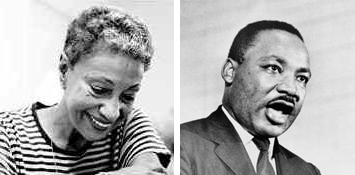
In honor of Martin Luther King Jr. Day, I thought I would briefly discuss June Jordan‘s unusual tribute poem, “In Memoriam: Martin Luther King, Jr.”
“In Memoriam . . .” is not a typical memorial poem. It begins with a rush of chaotic terror:
“honey people murder mercy U.S.A.
the milkland turn to monsters teach
to kill to violate pull down destroy
the weakly freedom growing fruit
from being bornAmerica”
“tomorrow yesterday rip rapeexacerbate despoil disfigurecrazy running threat thedeadly thrallappall belief dispelthe wildlife burn the breastthe onward tonguethe outward handdeform the normal rainyriot sunshine shelter wreckof darkness derogatedelimit blankexplode depriveassassinate and batten uplike bullets fatten upthe raving greed . . .”
“wild reversal hearse rehearsalbleach the blacklong lungingritual of fright insanity and moredeplorable abortionmore andmore”
The clipped anaphora of “more and / more” deposits us at an ominous juncture. Jordan does not say what “more” modifies, but we can guess. We sense that what is to come will only be an escalation of the violence previously depicted. We can read “more and / more” in a couple of ways: from one angle, it could be an indication that what follows the poem is so grotesque as to be unspeakable (or that the speaker herself has been silenced and forbidden to tell any more); on the other hand, if we are to think of “more and / more” as a dangling modifier rather than as one that has been clipped from the idea it is modifying, “more and / more” could imply a sense of exhaustion on the part of the speaker (i.e. that the perpetration of injustice has become so normalized as to make it mundane, and no longer worthy of further description). And yet, one must not forget that as the poet, Jordon has a level of agency not available to the voices contained within her poem. June Jordan is the outside agent who cuts off the poem at “more and / more” before its universe can spiral even further out of control. In a way, then, the practice of craft allows Jordan to participate in a kind of textual or virtual activism. Ending the poem here not only allows for a dramatic pause that gives the troubling picture she’s painted room to resonate, but also posits her (the poet) as a barrier against the onslaught of vitriol in much the same way that “STOP” operates at the end of Section I.
How, then, does Jordan’s piece serve as a “Memoriam”? It is not, in the traditional sense, an elegy; nor does it provide a retrospective summary of King’s accomplishments. Certainly, none of it is addressed directly to King or to his memory. But in a way, Jordan does pay tribute to King’s legacy by reenacting, in poetic form, his ultimate act: stopping a bullet with his chest. In losing his life, King gave credence to the ideas he’d espoused. His death became a rallying cry for many, just as in life, he’d called others to action by crying out “STOP” in the face of the injustice he saw swirling around him. The poem’s two movements—a stop, and stop again—seem to envision a cycle, in which the first act of crying out “STOP” makes possible the subsequent termination of the “insanity” and “deplorable abortion” in Section II before “more / and more” can come to fruition. Jordan’s speaker has no illusions about the state of the world in which we live — King’s work did not cause a complete end to racial inequality in America. We still live in a nation riddled with injustice. But the impact of King’s legacy is such that he did, for at least an instant, cause a hiccup, a disruption in the field that made people pause (even if uncomfortably so), and take note. And his cry of “STOP,” which resonated in the nation’s consciousness long after his body had succumbed to a bullet, has helped to enable later voices to cry “STOP” as the struggle for social justice continues.
To read Jordan’s “In Memoriam: Martin Luther King, Jr.” in its entirety, click here.
* * *
June Jordan is not the only poet whose reflections we’d recommend to you on this day of celebrating Dr. King’s legacy. A wealth of other poems that have been written about, or which were important to, the Civil Rights Movement have also been collected on the web. Here are a just a few sites that we thought were particularly interesting:
- The web site Civil Rights Movement Veterans has a great collection of Movement-related poems, organized by rough chronological periods (“from” and “about” the Movement, and “forerunners”). There’s a lot on the site, including some very famous poems by Johnson, Hughes, and Cullen, but I was especially moved by the private act of escape into the imagination depicted in Gregory Orr’s Solitary Confinement.
- Still more poems of note can be found by using the “Poems About Race” category in the Poetry Foundation‘s Poetry Tool (under “poems,” select “By Category” –> “Social Commentary” –> “Race”).
- And if you are interested in checking out Dr. King’s own words, the King Institute at Stanford University has an extensive selection of his correspondence and speeches on the multimedia section of its web site.
It has to be read, reread and read again. I initially thought it was just word and sound play without any accessible message. rereading revealed its ominous power and sharp blow to the head. the editor’s commentary helped to illuminate the narrative.